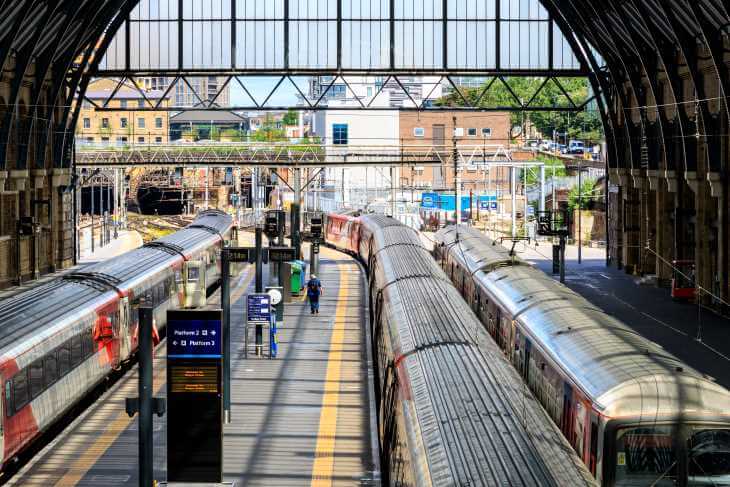It's said that only two things are guaranteed in life: death and taxes. But there's a third thing which could quite easily be added to that pair, and that's an increase in train fares. While there's no escape from it, could a season ticket be your best bet to beat the price rises?
UK rail ticket price hikes
As the UK stumbled into its first working day of 2019 back in January, some commuters faced an average train ticket price hike of just over 3%. It doesn't sound much, but if you're a regular train traveller, over the year, it adds up.
And when the trains are delayed - punctuality is at its lowest for 13-years - or cancelled altogether, it makes any price increase that bit harder to take. Even when trains do eventually arrive at the station, it can be standing room only in the carriages. But still, the prices go up with alarming regularity.
So what's the answer? Well, one answer is don't rely on train travel if you don't want to pay higher prices. But that's not a reasonable answer. Many of us don't have a choice - especially commuters in and around Greater London. The only thing you can do is to work with the options available to try and reduce the costs.
Travel off-peak
So how does this work in reality? Whenever you try to get the best deal on anything, it usually involves a bit of extra effort and a few workarounds. Reducing your ticket costs is no different, but it can be worth it. The first thing you could try is travelling 'off-peak'.
Peak travel times are usually considered to be from 7.00am - 9.00am and from around 4.00pm - 6.00pm during the week. Obviously, demand for train tickets is higher at these times because commuters use them to get to and from work.
This method isn't ideal if you need to get to work on time or have a meeting or appointment to get to which requires travelling at rush hour (peak time). But, if you can travel outside these times using off-peak train travel, most train companies (GWR, Virgin etc) sell cheaper tickets when the service is not as busy.
Buying in advance
Another tactic for keeping travel costs down is to buy your train ticket in advance. If you already know you need to be somewhere on a specific day in the next few months - perhaps you're attending an exhibition or a conference - buying advance train tickets for a one-off trip can give you big savings.
Both one way and return tickets can usually be bought up to six months in advance and buying early can usually mean buying cheaper. Prices can fluctuate from day to day, but keeping an eye on them and buying in advance will almost certainly save you money.
Railcards and split ticketing
If you happen to fall into a certain rail pigeon hole, a discounted railcard might also offer you a cheaper alternative. The discount railcards are available to a range of people and are split into six categories: 16 - 25, 26 - 30, Senior (over 60), Family & Friends, Two Together, and Disabled Persons.
Each category offers a �..." off rail fares across Britain and the railcard last for one year. There's even a new railcard for anyone aged 16 - 17 coming later in 2019 which offers a 50% discount. For regular travellers, this could be a good option.
Another way to beat the fares is to opt for split ticketing. Rather than buying one outward ticket from your station to wherever you're going, it can be cheaper to split the same journey into several tickets as long as you stay on the same train. Again, this takes a bit of effort, but split train tickets can save you money.
Rail season tickets
The ultimate saving for rail travel though is to buy a season ticket. As probably the best - not to mention the easiest - option for regular train travellers and commuters, it can save you both time and money.
If you need to make your train journey more than three times a week, then a season ticket is much more cost-effective. Tickets are available as Weekly or Monthly options, but the longer your ticket is valid for, the bigger the saving. So if you buy an annual season ticket which is valid for 52 weeks, it would cost the same as 40 Weekly tickets.
And apart from saving the hassle of queuing for your ticket each week or month, the flexibility is also a huge bonus. A season ticket gives you unlimited travel between your home station and your destination station, so you can come and go as many times as you need to.
The only drawback to an annual season ticket is the cost - like any other ticket, you pay for your travel upfront. So, depending on where you live and where you need to get to, the ticket cost could run into the thousands. Not only is this a big financial outlay to make in one go, but you might struggle to find such a large sum at all.
Let Car Cash Point take the strain
One of the best ways to help you get the funds you need is to take a transparent and flexible logbook loan from Car Cash Point. As one of the UK's leading logbook loan lenders, we offer a low rate of interest on loans from £500 up to £100,000 with no hidden fees or charges - and getting one couldn't be easier.
If you own your car outright with no outstanding finance, Car Cash Point can give you a secured loan against the value of your car, directly into your account. With our flexible repayment plans, you can choose the way you make your payments to suit the way you receive your own income.
And there are no credit checks. You'll still be able to take advantage of a loan from us, even if you've experienced any credit issues in the past. Plus, we have one of the lowest rates of interest of any logbook loan - almost half of the other lenders.
So, to get a fast, secure, and flexible loan against your car to help buy your rail season ticket, call our award-winning team on 0330 057 8701.




